The transition between the Mauricio Macri and Alberto Fernández administrations has put Argentina's economic and social priorities on the table, including the administrative matters of the government. But there is another issue, perhaps even as important to politicians and voters, that has yet to come to public light in the process: the trials and judicial proceedings of those who some call “corrupt” and others call “political prisoners.”
Since the electoral campaign started, the winds of change have begun to blow thorough the Comodoro Py federal courthouse and its surroundings, bringing hope and relief to Kirchnerite prisoners. There has also been a tightening in the Supreme Court regarding the wishes of the PRO government. This has led to an embarrassing consensus within public opinion, on both sides of the “grieta” (the political divide in Argentina). There is a public acceptance that, in the immediate future, we will see the dropping of charges against Kirchnerite figures and new ones brought against Macri administration figures.
This cynical prediction about the rapid flip-flopping of the Judiciary has been confirmed by several court developments, yet the tempered defeat of the Macri's party after the catastrophic defeat in August PASO primaries has relativised several certainties. Yet the new relationship between parliamentary forces, after this year’s elections, continues to overshadow the workings of the underground transition.
The electoral improvement of Juntos por el Cambio, Macri’s political coalition, will deliver a more balanced Congress than Kirchnerites expected. With the greater allocation of seats to the incumbent’s party, the make-up of the Consejo de la Magistratura ("Magistrates Council"), a key organ for the oversight of judges.
The same happened with potential Kirchnerite plans for constitutional reform, which are largely focused on an overhaul of Comodoro Py. The result of the polls does not allow for sweeping reform, as dreamt up by Justicia Legítima (the civil association that seeks the "democratisation" of the Judiciary) and other national and popular forums.
Just in case, lawyers of various condemned and convicted Kirchnerite prisoners have started to lobby in favour of bol moves that would see “political prisoners,” as they describe them, set free. Former vice-president Amado Boudou and his legal team has already shown his enthusiasm for a plan; that would see the new Congress call for a review of proceedings against Kirchnerite figures during Macri's time in office.
From all angles, a chain of events that once looked like a simple judicial process for Frente de Todos is now not so simple. Some of the investigations against Cristina Fernández de Kirchner may fall, but not all. It is possible we will see Macri and his people walking through the corridors of the courts too. The relatively bipartisan approach we have seen since October 27 could enable a certain climate of autonomy among judges, who could utilise their 'anti-K' and 'anti-M' probes as shields to protect them from attacks on their person. This new scenario of judicial complexity encourages paranoia among everyone in Frente de Todos – the Cristinistas, the pure Peronists, the Massistas and the Albertistas – as well as the different factions within Juntos por el Cambio.
These details are all part of the secret agenda being discussed on both sides behind closed doors, while officials from both transition teams pose for poignant photos that fatten the photo album of national reconciliation.



















Comments